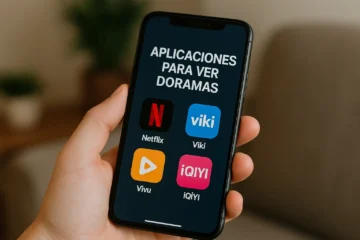Music App: Your Ideal Partner!
Advertisement advertisements
With these Music applicationYou can access millions of tracks from around the world, create playlists, discover new artists and genres, and enjoy recommendations based on your music preferences.
In addition, many of these applications allow you to download music for offline listening, which is ideal for those times when you don't have access to the Internet.
In short, music apps offer a convenient way to enjoy your favorite music anytime, anywhere. Below, we will explore the best music apps available.
Benefits of Using a Music Application
- Unlimited Music AccessMusic apps offer a vast library of songs from various genres and artists. You can access millions of tracks without downloading individual files.
- Offline PlaybackMany applications allow you to download songs to listen to them without internet connection, ideal for when you are traveling or in places with poor connectivity.
- New Music DiscoveryWith advanced algorithms, these applications can recommend new songs and artists based on your musical preferences.
- Custom PlaylistsYou can create and customize your own playlists for any occasion, whether it's a party, a workout or a relaxing evening.
- Integration with Social NetworksSome applications allow you to share your songs and playlists with friends through social networks, creating a more interactive music experience.
The Best Music Apps on the Market
Spotify
Spotify is one of the most popular music applications in the world.
It offers a huge library of songs and podcasts, with free and paid options.
Its user-friendly interface and powerful music recommendations make it a favorite choice for many users.
Advantages:
- Large library of music and podcasts.
- Customized recommendations based on your tastes.
- Lists of collaborative reproduction and sharing options.
- Offline mode in the premium version.
Disadvantages:
- The version free has advertisements.
- Some artists and albums may not be available.
Apple Music
Apple Music is the ideal choice for Apple device users.
It offers a wide range of songs and albums, along with exclusive content and live radio stations.
It also allows you to download music for offline listening.
Advantages:
- Seamless integration with Apple devices.
- Library of more than 75 million songs.
- Exclusive content and early launches.
- Possibility of listen to music offline.
Disadvantages:
- It does not have a free version.
- The interface may not be as intuitive for some users.
YouTube Music
YouTube Music combines music videos with audio tracks, offering a unique experience. Its ability to find live versions, remixes and exclusive YouTube content makes it stand out.
Advantages:
- Wide availability of music videos and exclusive versions.
- Recommendations based on YouTube history.
- Integration with Google and other YouTube services.
Disadvantages:
- The free version has ads.
- May consume more data due to videos.
Amazon Music
Amazon Music offers access to a vast collection of music and is an excellent option for Amazon Prime subscribers.
The application also allows you to download music for offline listening and offers personalized recommendations.
Advantages:
- Included with Amazon Prime (Amazon Music Prime).
- Extensive library with more than 70 million of songs.
- Offline mode for listen offline.
- Recommendations based on your tastes.
Disadvantages:
- The free version has limitations in the library and functions.
- The interface may not be as user-friendly as other applications.
Deezer
Deezer is known for its huge library of songs and its Flow feature, which creates a personalized soundtrack based on your musical tastes. It also allows you to download music for offline playback.
Advantages:
- Flow function for personalized recommendations.
- Large library of more than 73 million of songs.
- Options for high audio quality.
- Offline mode in the premium version.
Disadvantages:
- The free version has ads and limitations.
- Less exclusive content compared to other services.
Each of these music apps has its own advantages and disadvantages, and choosing the best one will depend on your personal needs and preferences. Spotify stands out for its recommendations and sharing options, Apple Music for its integration with Apple devices and exclusive content, YouTube Music for its unique combination of videos and music, Amazon Music for its integration with Amazon Prime and Deezer for its Flow feature and audio quality. Explore these options and choose the one that best suits your lifestyle and musical tastes.
What is a Music Application?
A music application is software designed to play, organize and manage music on mobile and other electronic devices.
These applications offer a variety of features, such as the ability to create playlists, access radio stations, listen to music in offline mode and much more.
Frequently Asked Questions about Music Applications
1. Can I use music applications without an Internet connection?
Yes, many music apps allow you to download songs for offline listening, although this feature is usually only available in paid versions.
2. Are music applications free?
There are free and paid music apps. Free versions usually include ads and have limited features, while paid versions offer an ad-free experience and access to more features.
3. How do music applications choose the songs they recommend to me?
Music apps use advanced algorithms that analyze your listening habits, music preferences and the songs you have saved or added to your playlists to provide you with personalized recommendations.
Can I share my music with friends through these applications?
Yes, many music applications allow you to share songs and playlists with friends through social networks or directly from the application.
What happens to my music if I cancel my paid subscription?
If you cancel your paid subscription, you will normally lose access to premium features, such as ad-free playback and downloading songs for offline listening. However, you will still be able to use the free version of the app.

Final Considerations on Marketplace Music Applications
When choosing a music application, it is important to consider several factors:
Music LibraryMake sure the application offers a vast collection of songs that include your favorite genres and artists.
Audio QualitySome applications offer different levels of audio quality. If you are an audiophile, look for options that offer high fidelity audio.
Device CompatibilityVerify that the application is compatible with all your devices, whether they are smartphones, tablets, computers or speaker systems.
Additional FunctionalitiesConsider additional features such as the creation of personalized playlists, music recommendations, integration with social networks and the ability to download music for offline listening.
CostEvaluate whether you prefer a free version with ads or if you are willing to pay for a premium subscription to enjoy a seamless, full-featured experience.
Ultimately, the best music app for you will depend on your personal preferences and how you plan to use it. With so many options available, you're likely to find the perfect app to meet your musical needs and enrich your daily listening experience.





